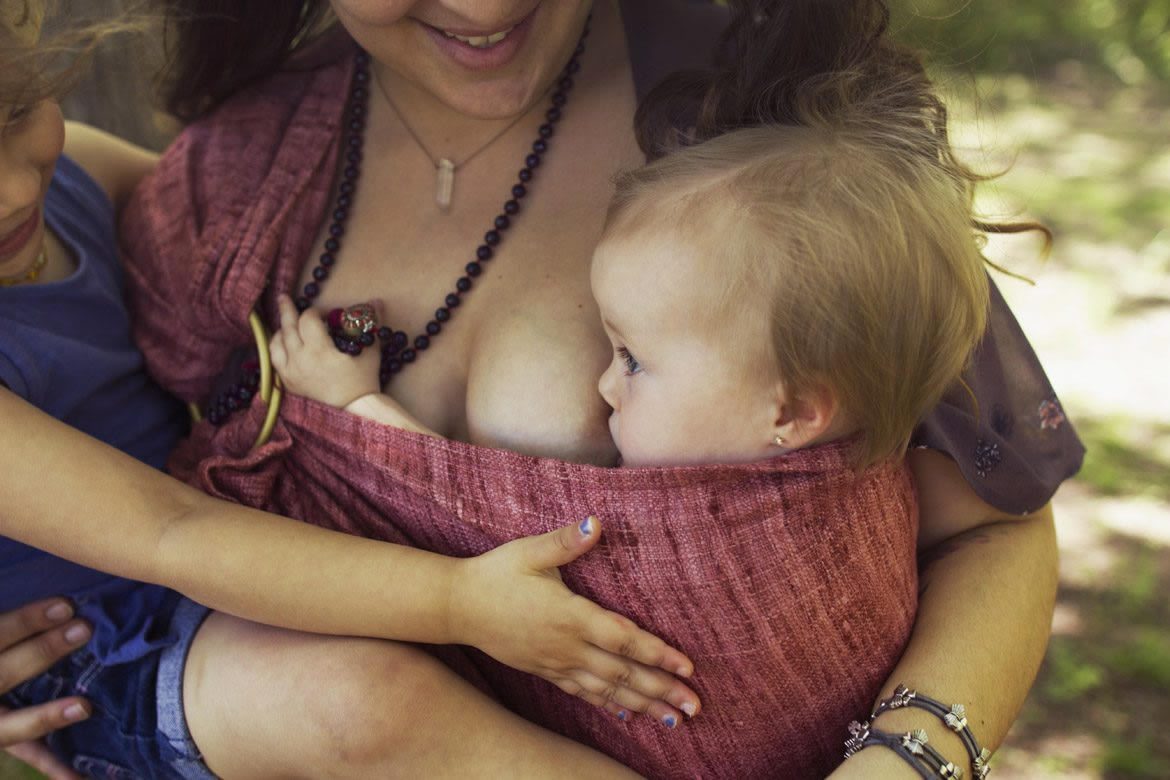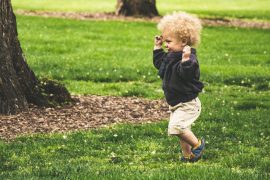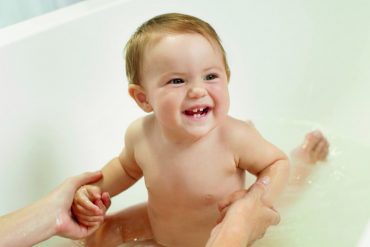By Robin Grille. This is an article from the very first issue of The Natural Parent Magazine.
Have you noticed that quite a few mothers and fathers are now ‘wearing’ their babies in a sling? They look quaint, and kind of ‘tribal’, don’t they? You may have felt confronted by the sight of a mother nursing a toddler (isn’t he too old for that?!). You might know a couple who sleep with their baby in bed with them (are they crazy?).
They may all be practicing attachment parenting – learning to interpret and respond to babies’ specific need-cues, and meeting their emotional needs on their own terms. This kind of parenting stresses the importance of things like gentle birthing methods, breastfeeding babies on demand, child-led weaning, sleeping close to baby, and wearing baby on your body during the day. These measures are designed to foster babies’ healthy emotional development. It is claimed that this will make them more resilient, more autonomous and better able to have good relationships as they grow. Is this a romantic New-Age ideal? Is it based on anything scientific?
In fact, attachment parenting is the culmination of the largest body of international research ever compiled on child development and emotional intelligence. The basic premises are:
- In order to feel secure, and for healthy emotional development, babies need to feel ‘attached’ to a few, consistent, carers (preferably mum, dad, close kin or friends) that are dependably warm and responsive.
- Secure attachment depends on how closely parents are able to respond to their babies’ dependency needs.
- Insecure attachment may have a profound, long-term negative impact on emotional development, personality and human relationships.
Over the last couple of decades, hundreds of meticulously constructed studies have been conducted around the world, telling us some crucial things about how children develop emotionally. We have learned that babies are not born predisposed to feeling secure or insecure and that the key to secure attachment is the parents’ warmth, and their prompt and consistent efforts to soothe their babies’ distress. We have also learned that we cannot ‘spoil’ our babies by always responding to their needs, and our impatient push to make them more independent inhibits their exploration, and tends to make them more clingy. Overall, attachment research has shown us why we should avoid leaving our babies to cry, or deliberately force them to wait for soothing contact or nourishment.
Studies have enabled researchers to determine that early attachment experiences have far-reaching psychological and social repercussions.
Insecurely attached babies are more likely to become insecure as children. Emotionally secure babies, on the other hand, enjoy many personal advantages as toddlers – they are likely to become more enthusiastic, persistent and cooperative and they tend to be less oppositional, less angry, less fearful and more joyous. Secure babies grow to be more popular among their peers, more socially competent, and more capable of empathy towards others. The implications are momentous: children’s moral development, as well as their social development, is a function of how sensitively they were treated as babies, how promptly and consistently their needs were attended to.
Toddlers who were securely attached as infants are more resilient, and more independent. Because they are more assertive, these children are more difficult to bully, and hence they are less likely to be targeted. Conversely, insecurely attached babies tend to seek attention in oblique or irritating ways and are more likely, as they grow, to be either clingy and hypersensitive, or aggressive and disruptive.
Much of what may be labeled as a ‘discipline problem’ or a ‘behaviour problem’ has its genesis in the attachment stage. Children who have spent enough time away from their parents to become insecurely attached tend to be less compliant with their parents. On the other hand, a number of studies show that children who are emotionally secure are more cooperative and develop a stronger conscience. Findings such as these are forcing us to reappraise our views on ‘good behaviour’. They suggest that the most important ‘discipline’ method is to ensure that our babies benefit from secure attachment; if we want ‘good’ children, we first of all must fulfill their dependency needs.
Security of attachment is also relevant to the issue of sibling rivalry. Children who are emotionally secure are more likely to comfort distressed younger siblings, and less likely to get into conflicts with them. This is not surprising, since empathy arises out of emotional security.
The effects of early attachment are long-term. Studies show that ten year olds who were treated with acceptance and sensitivity as babies tend to be more self-confident and less hostile. Teenagers with a secure attachment history are better able to handle conflict, are more assertive, less angry and more admired by their peers. There is an increasing sense that many psychopathologies in teenagers – such as depression, or anxiety disorders – may be traceable to their attachment history.
Insecure attachment also makes us more vulnerable to stress-related problems as adults. For instance, survivors of trauma who have had a stable attachment history are less likely to develop post-traumatic stress disorders, but if early attachment relationships are seriously disrupted, this can contribute to depression, bipolar disorder, anxiety disorders, panic attacks, agoraphobia and even eating disorders. Insecure attachment can also foster a range of anti-social behaviours, contributing to the incidence of violent crime and delinquency.
For human babies, there is evidence that the natural weaning age is probably well over two years, and anywhere up to six or seven years. Certainly we know that breastfeeding affords a vital psychological and immunological sustenance which goes on long after it is nutritionally necessary. We also know that it is one of the main sources of security and emotional wellbeing for babies and toddlers – suckling stimulates the secretion of oxytocin, a hormone associated with peaceful contentment, and this is passed directly to the baby through the mother’s milk. Our early weaning standards certainly warrant revision.











